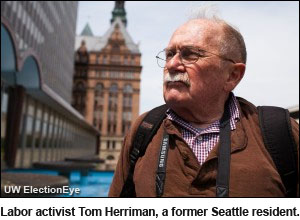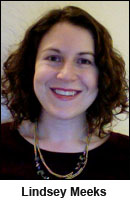OPINION
Washington state provides solidarity, support in Wisconsin
MILWAUKEE — Washington and Wisconsin have a few things clearly in common. Washington has the UW, and Wisconsin has the other UW. They also share an affinity for a good local microbrew. And when I was cutting it close to making it for an interview, I was delayed by a lifting drawbridge — it almost felt like home.
And that’s the way union leaders in the two states want it: tight and connected. Especially now.
On June 5, Wisconsin Governor Scott Walker (R) faces Milwaukee mayor Tom Barrett (D) in a rare recall election sparked by Walker’s move to cut collective bargaining for public union employees.
Washington unions have joined the battle.
Washington state union members have made the trek to Wisconsin to support their allies, said Adam Glickman-Flora, Director of Public Affairs for SEIU, Washington’s Service Employees International Union.
Additionally, the University of Washington’s UAW Local 4121, the Union for Academic Student Employees at UW, is standing in solidarity with Wisconsinites. A recent e-mail to union members stated, “As we complete our successful collective bargaining campaign, in which thousands of us here at UW have participated in a process that allowed us to democratically determine our agenda and negotiate as equals with our employer, we now have the opportunity to help workers in Wisconsin who want their rights restored.” They then urged members to call union members in Wisconsin between May 29 and May 31. (Full disclosure: I am a member of this UW union.)
The Washington State Labor Council (WSLC), a state federation of the AFL-CIO, has set up two phone banks and are encouraging members to call union members in Wisconsin. WSLC has also conducted a number of events over the last year, including a joint rally with union members from Oregon and British Columbia at Peace Arch Park, and another rally in Olympia in an effort to energize voters against Walker and toward Barrett.
Union members with Washington roots are in Wisconsin, too.
 Retired Teamster Tom Herriman moved to Ballard from Brooklyn, New York, in 1991, where he was an active organizer for the Teamsters and a freelance carpenter. Herriman and his wife moved to Washington D.C. two years ago, but they still own their Ballard home and hope to return there once his wife retires. I met Herriman at a protest and march organized by SEIU in Milwaukee.
Retired Teamster Tom Herriman moved to Ballard from Brooklyn, New York, in 1991, where he was an active organizer for the Teamsters and a freelance carpenter. Herriman and his wife moved to Washington D.C. two years ago, but they still own their Ballard home and hope to return there once his wife retires. I met Herriman at a protest and march organized by SEIU in Milwaukee.
Herriman has been volunteering as part of the recall effort in Wisconsin for two months, and said he felt compelled to lend his support because “this is the most important election of the year.” Herriman said that Wisconsin voters need to recall Walker or Wisconsin will likely become a right-to-work state.
Herriman has spent a lot of his time knocking on doors, trying to motivate voters. On any given day he has a list of 50 to 100 addresses and says he doesn’t focus on trying to change minds. Instead, he said, “I concentrate on those that are likely to vote and just need a little push.” Herriman plans to be in Wisconsin through the election.
Unions have been central to this Walker-Barrett contest since the beginning.
Walker beat Barrett in the 2010 gubernatorial election by seven points, and shortly after Walker took office in January 2011 he proposed the Wisconsin budget repair bill on Feb. 11, 2011. Walker said the bill would save Wisconsin hundreds of millions of dollars over two years by requiring state and local government workers to contribute more to their health care plans and pensions. For instance, the bill would increase the average cost of annual health insurance premiums from 6% to over 12%. The bill also sought to remove most collective bargaining rights for unions of public employees.
In response to the proposal, protests broke out on the Wisconsin Capitol grounds, and even inside the building. The protests still continue today: each weekday protestors gather on the capitol lawn to do a singalong protest.
The debate over collective bargaining is centralized in Wisconsin, but union leaders in Washington see similarities between the two states’ upcoming gubernatorial elections.
Kathy Cummings, WSLC communications director, said “We are very interested in what is happening in Wisconsin. The blatant attacks on collective bargaining and the legal right to form a union is a setback for all American workers. We believe in the fundamental right to have a voice in the workplace. We are paying very close attention to the Governor’s race [in Washington] because we see Rob McKenna as a sort of ‘Scott Walker in hiding’.”
In 2011, McKenna, the likely Republican Party nominee for Washington state governor, said collective bargaining by public sector unions was “dangerous.” In a speech given in October 2010 to the Snohomish County Republican Women’s Club, McKenna said, “FDR, by the way, among other little known facts, was strongly opposed to the unionization of public employees. He understood why you don’t need the unionization of public employees. And why it would be dangerous for it to happen.”
Jay Inslee, the likely Democratic Party gubernatorial candidate, has voted in Congress in support of collective bargaining, including a 2007 vote for collective bargaining rights for public safety employees. And at the annual Washington Education Association convention on May 18, Inslee said, “As Governor, I will not allow a Wisconsin-style attack on teachers to happen in the state of Washington.” In the six months after Walker’s bill passed, thereby cutting benefits and collective bargaining for teachers, 5,000 teachers retired in Wisconsin — roughly twice the normal attrition via retirement for a comparable time period.
Cummings said there is a bright spot for unions: “Since the [2010] midterm elections the unions have seen an increase in rhetorical attacks from the [political] right but at that same time, the outpouring of solidarity of union members both in states, and overall throughout the country, has become stronger.”
From Puget Sound to Lake Michigan, it appears.
Lindsey Meeks is a Doctoral Candidate in the Department of Communication at the University of Washington and a member of UAW Local 4121, the Union for Academic Student Employees at UW. This column originally appeared at the The Seattle Times’ UW Election Eye blog, and is reposted here with the author’s permission.






